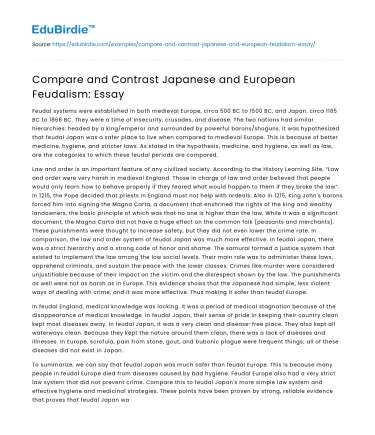Feudal systems were established in both medieval Europe, circa 500 BC to 1500 BC, and Japan, circa 1185 BC to 1868 BC. They were a time of insecurity, crusades, and disease. The two nations had similar hierarchies: headed by a king/emperor and surrounded by powerful barons/shoguns. It was hypothesized that feudal Japan was a safer place to live when compared to medieval Europe. This is because of better medicine, hygiene, and stricter laws. As stated in the hypothesis, medicine, and hygiene, as well as law, are the categories to which these feudal periods are compared.
Law and order is an important feature of any civilized society. According to the History Learning Site, “Law and order were very harsh in medieval England. Those in charge of law and order believed that people would only learn how to behave properly if they feared what would happen to them if they broke the law”. In 1215, the Pope decided that priests in England must not help with ordeals. Also in 1215, King John's barons forced him into signing the Magna Carta, a document that enshrined the rights of the king and wealthy landowners, the basic principle of which was that no one is higher than the law. While it was a significant document, the Magna Carta did not have a huge effect on the common folk (peasants and merchants). These punishments were thought to increase safety, but they did not even lower the crime rate. In comparison, the law and order system of feudal Japan was much more effective. In feudal Japan, there was a strict hierarchy and a strong code of honor and shame. The samurai formed a justice system that existed to implement the law among the low social levels. Their main role was to administer these laws, apprehend criminals, and sustain the peace with the lower classes. Crimes like murder were considered unjustifiable because of their impact on the victim and the disrespect shown by the law. The punishments as well were not as harsh as in Europe. This evidence shows that the Japanese had simple, less violent ways of dealing with crime, and it was more effective. Thus making it safer than feudal Europe.
Save your time!
We can take care of your essay
- Proper editing and formatting
- Free revision, title page, and bibliography
- Flexible prices and money-back guarantee
In feudal England, medical knowledge was lacking. It was a period of medical stagnation because of the disappearance of medical knowledge. In feudal Japan, their sense of pride in keeping their country clean kept most diseases away. In feudal Japan, it was a very clean and disease-free place. They also kept all waterways clean. Because they kept the nature around them clean, there was a lack of diseases and illnesses. In Europe, scrofula, pain from stone, gout, and bubonic plague were frequent things; all of these diseases did not exist in Japan.
To summarize, we can say that feudal Japan was much safer than feudal Europe. This is because many people in feudal Europe died from diseases caused by bad hygiene. Feudal Europe also had a very strict law system that did not prevent crime. Compare this to feudal Japan's more simple law system and effective hygiene and medicinal strategies. These points have been proven by strong, reliable evidence that proves that feudal Japan was safer than feudal Europe.






 Stuck on your essay?
Stuck on your essay?

